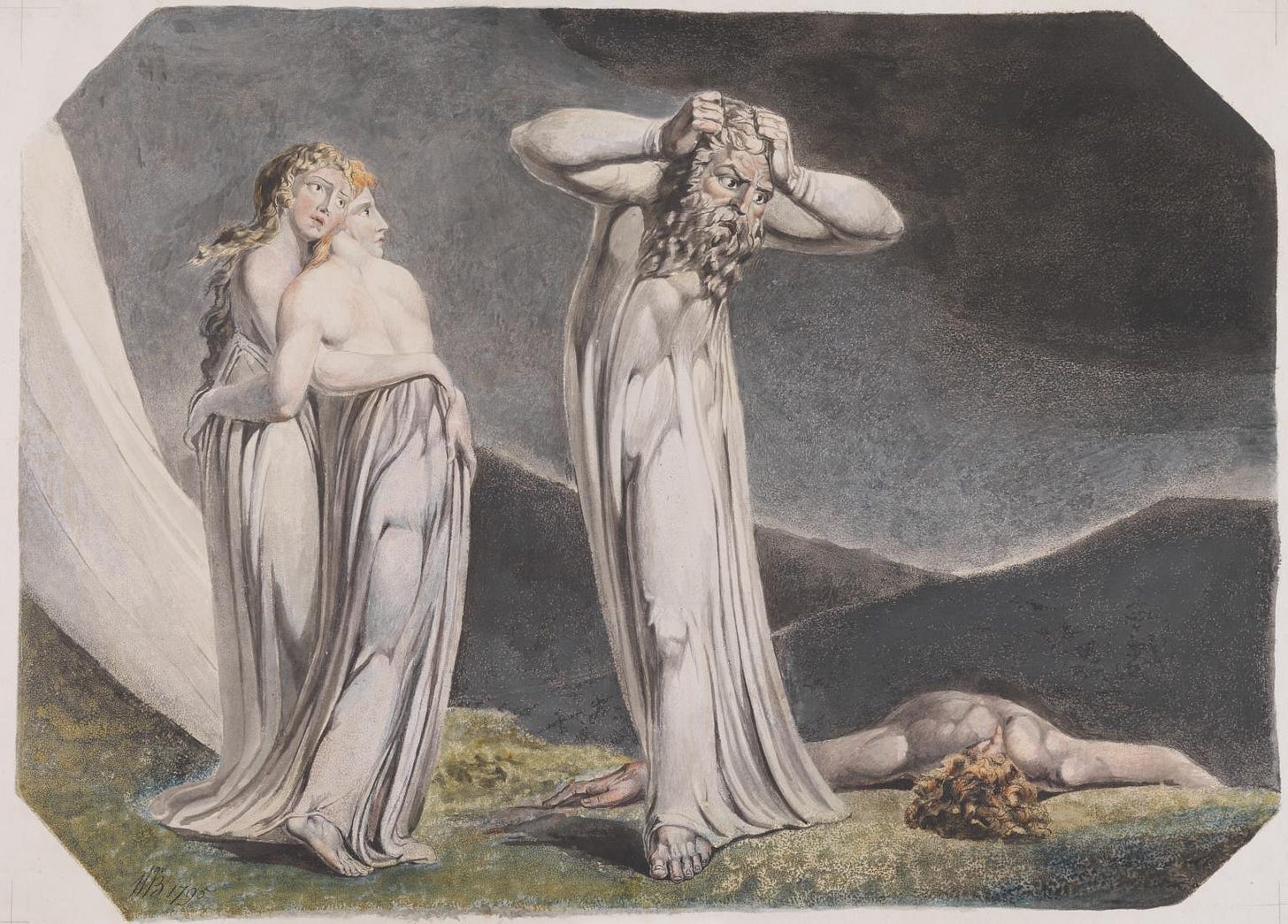In these verses we get the descendents of Cain: Chanok, Irad, Mechuyel, Methushael, Lemech, Yaval, Yuval, Tuval Cain, Naamah.1 I’ve long dreamt of a group who cared only for the genealogy of the Bible and skipped over the stories and laws to read the long lists of names. The commentary on the genealogy in Genesis Rabbah is, as usual, interesting:
"And Enoch begat Erad..." Rabbi Yehoshua ben Levi said: They all refer to rebellion. Erad - I will drive him out from the world. Mechuya'el - I will erase him from the world. Metusha'el - I will weaken him from the world. Lemech - What do I need with Lemech and his descendents? "And Lemech took for himself two wives, one was named Adah and the second was named Tzilah" (Genesis 4:19). Rabbi Azariah said in the name of Rabbi Yehudah bar Simon: this is what the men of the generation of the Flood would do: each of them would take two wives, one for procreation and one for pleasure. The one who was for procreation would sit as if she was a widow in her own lifetime (in the lifetime of her husband), and the one that was for pleasure would drink a cup for sterility so that she did not bear [children], and would sit by him adorned like a prostitute. As it is written: "He devours the barren that do not conceive, and does not do good to the widow" (Job 24:21). Know that among them the best was Lemech, and he took two wives, as it says "And Lemech took for himself two wives, one was named Adah" - because she became pregnant [adah] "and the second was named Tzilah" - because she sat in his shade [tzel].
St. Ephrem of Syria, whose feast we celebrated at the end of January, says in his commentary that the man murdered by Lemech may have been Cain:
Others say that Lamech, who was cunning and crafty, saw the plight of his generation: that the Sethites refused to intermingle with them because of the reproach of their father Cain, who was still alive, and that the lands would become uncultivated from the lack of plowmen and their generation would thus come to an end. Lamech, therefore, moved by zeal, killed Cain together with his one son whom he had begotten and who resembled him, lest through this one son who resembled him the memory of his shame continue through their generations. When he killed Cain, who had been like a wall between the two tribes to keep them from tyrannizing each other, Lamech said to his wives as if in secret, “A man and a youth have been killed, but take and adorn your daughters for the sons of Seth. Because of the murders that I have committed and because of the adornment and beauty of your daughters, those who refused to be married to us in the past six generations might now consent to marry with us in our generation.”2
St. Basil disagrees:
Some think that Cain was destroyed by Lamech on the grounds that he lived until that time to pay the longer penalty. But this is not true. For Lamech seems to have perpetrated two murders from what he tells us. “I have killed a man and a youth”—the man for wounding and the youth for bruising. Now, a wound is one thing and a bruise another; and a man is one thing and a youth another. “For Cain shall be avenged sevenfold, but Lamech seventy times sevenfold.” It is right for me to undergo four hundred and ninety chastisements, if truly God’s judgment against Cain is just, that he should undergo seven punishments. In fact, as he did not learn to murder from another, so he did not see the murderer undergoing the penalty. But I, having before my eyes the man groaning and trembling and also the greatness of the anger of God, was not brought to my senses by the example. Therefore I deserve to pay four hundred and ninety penalties.3
These are rich verses, and the commentary tradition is appropriately rich.
My translation:
Cain withdrew
from God
dwelled in Nod
east of Eden
He knew
his wife
she birthed
Chanok
Founding a city
he named it
Chanok
after his son
Born to Chanok,
Irad
To Irad,
Mechuyel
To Mechuyel,
Methushael
To Methushael,
Lemech
Lemech took
two wives
Ada, Tzilah
Born to Ada,
Yaval
father of tent dwellers, herders
Yuval
father of lyre and flute
To Tzilah,
Tuval Cain
forging brass and iron
his sister
Naamah
Lemech said to his wives
Ada
Tzilah
Listen to me!
I killed
a man
for wounding me
a boy
for striking me
If for Cain
sevenfold
for me,
seventy more
Again, Adam knew Chava
as his wife
She birthed a son
called Shet
God put a son
in place of Hevel
murdered
by Cain
Born to Shet,
Enosh
a son
Man began
to cry
in the name
of the Lord.I translated the tetragrammaton in 4:16 as “God” in this draft because I liked the sound of the rhyme and could not help myself. I doubt this choice will survive revision.
If you enjoy my translation, please share it and subscribe:
Rabbi Abba bar Kahana said: Na’amah was Noah’s wife. Why was she called Na’amah? Because all of her deeds were pleasant (ne’imim). The Rabbis said this is a different Na’amah. Why was she called Na’amah? Because she beat on a drum to draw people to idol worship. (Genesis Rabbah 23:3)
Louth, Andrew – Conti, M. (ed.), Genesis 1–11 (Ancient Christian Commentary on Scripture; Downers Grove, IL 2001) 113.
ibid.




